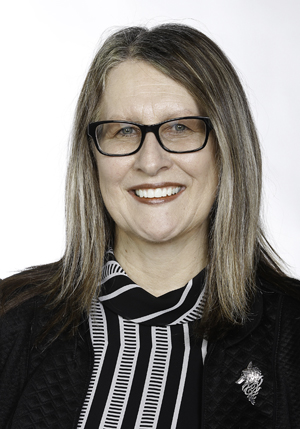News
» Go to news mainInternational Women's Day ‑ Loretta Robichaud Class of '89
Loretta Robichaud grow up on a fur farm (foxes) on the French Shore of Nova Scotia. Her father was a visionary when it came to farming - first having foxes, then alpacas and later raspberries.
 Loretta’s parents were the inspiration and driving force for her to pursue a career in agriculture at a time when female leaders were in the minority. In 1999, she shared with her master’s class that she would someday be the first female deputy minister in agriculture. She was not, but perhaps the vision was set.
Loretta’s parents were the inspiration and driving force for her to pursue a career in agriculture at a time when female leaders were in the minority. In 1999, she shared with her master’s class that she would someday be the first female deputy minister in agriculture. She was not, but perhaps the vision was set.
Loretta completed her undergraduate degree from Humber College and her B.Sc. in Agriculture from NSAC with a major in plant protection and a minor in economics. She also holds a Master’s in Public Administration (Management) from Dalhousie University.
“When I came to NSAC it was 1986. I transferred from Humber College in Toronto where I had been studying Retail Floriculture and wanted to pursue a new degree-granting program in Plant Protection,” she explained. “The characteristics that drew me to the campus at that time are still evident today. I can best describe it as having a tremendous sense of place and purpose.”
Loretta has had a diverse career leading to her current position as the Deputy Minister of the Nova Scotia Department of Agriculture and the Nova Scotia Department of Fisheries and Aquaculture appointed July 16th, 2020.
Loretta has extensive experience on strategic partnerships with a focus on collaborative initiatives and creating environments for sector growth. She has worked with the Nova Scotia Government for over 31 years in many positions including Executive Director, Agriculture and Food Operations and as permanent alternate at the deputies table for several years before her appointment.
“Atlantic Canada is connected in very productive ways,” explained Loretta. “We are small by comparison to the rest of Canada, but I think this creates its own set of advantages. It requires us to work jointly for a mutually beneficial outcome. We have learned to maximise our limited resources at an Atlantic level. We know our unique areas of speciality and we support each other in this regard without duplication of valuable resources. This type of collaboration and cooperation is second to none. I see this everyday from the top levels of government to frontline workers.”
Loretta also sees advantages in our diversity in production.
“Our diversity in production is also an advantage for producers that understand the benefits of risk reduction through diversification. The ability to work together also affords us opportunities to reach goals jointly that would not be available as a single province due to shear size.”
With every advantage can also come challenges to farming in Atlantic Canada especially climate change.
“The climate is unforgiving at times with frost and hurricanes. These weather events are difficult to navigate but as they become more prevalent, we ensure the support networks continue to advance for our producers. This takes on many forms whether its extension support, risk management programs, insurance-based programs to help manage the risk and research and development to manage in these challenging times,” said Loretta.
However, the opportunities are endless.
“We have amazing innovators in our provinces. Automation in our sectors is lending itself to tremendous improvements as we struggle with labour shortages and the need for new ways of doing business,” she explained. “Climate change has also presented opportunities to grow and process new crops that were not previously sustainable in our regions such as cold climate wine production.”
While challenges like climate change and a global pandemic have put agriculture at the forefront, Loretta can always see a positive.
“The pandemic has resulted in extensive moves to online learning on the Agricultural Campus and I think this is a significant change and demonstrates there are various learning models and demographics, which are shifting to more online learning,” she explained. “It is truly amazing to see the enrollment possibility with global reach. This was not imaginable back in 1986-1989 when I was a student.”
When Loretta has some down time she loves to garden, hike and fish. She also enjoys the opportunity to work from the Agricultural Campus several days per month.
She calls Bible Hill home along with her husband Ben and her teenager son Noah and daughter Eden.
Recent News
- Submissions to TV screens
- Three alumni, four rings
- Upcoming Workplace Wellness activites ‑ May
- A home away from home – Barley Party 2024
- Dalhousie University investigates natural therapeutics to manage cancers of companion animals
- Dr. Derek Lynch honoured for Outstanding Leadership in Organic Science
- Lifting Nova Scotia Workshop
- Truro Students Shine at MacRae Library Research Poster Competition
